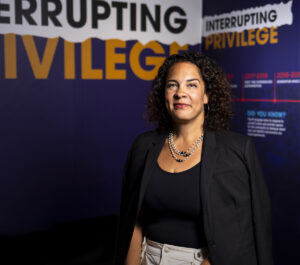
In honor of Martin Luther King Jr. Day, the University of Washington and the UW Office of Minority Affairs & Diversity are proud to recognize Ralina Joseph, associate dean of equity and justice for the UW Graduate School; founder and director of the UW Center for Communication, Difference and Equity; and professor of communication. Professor Joseph was a first-generation college student and began her career 20 years ago as an assistant professor of communication at the UW, after earning a bachelor’s in American studies from Brown University and a master’s and doctorate in ethnic studies from the University of California, San Diego. As a professor, scholar, mentor and leader, Joseph’s deep curiosity and inquiry about race and its intersections has left an indelible mark on the UW and beyond. In 2016 she created Interrupting Privilege, a program that facilitates intergenerational conversations on how privilege shows up in areas from race to gender to citizenship and beyond.
We spoke with Professor Joseph about her career at the UW as one of the first few faculty members of color, her dedication to anti-racist education, and her community-engaged work.
Tell us about your journey at the UW.
For me, the UW is a place that says yes to lots of things. If infrastructure was not in place, I could figure out a couple of partners to connect with, begin the community work and find many people who wanted to join me. So that’s been a lot of my story at the UW from the beginning. I was one of the few faculty members of color in my department, and I was hired alongside several women of color faculty across the campuses who were also the first or one of the first in their departments. We didn’t have mentorship in our faculty, so we found each other and created lifelines including an organization of women of color faculty called WIRED: Women Investigating Race, Ethnicity and Difference, which grew to 70-something members across the three campuses.
In 2015, together with a team of staff, faculty, students and community members, I founded the Center for Communication, Difference and Equity (CCDE) following the 2014 Ferguson uprising and the murder of Michael Brown. We wanted to have teach-ins to support our students. Our students were feeling shell-shocked, walking around and feeling like there weren’t spaces in the classroom where faculty could attend to all of their emotions, critique the racialized violence around them, and move forward together. The Center really grew from that. About a year in, we started bringing people together to have conversations across generations and across races. We began hosting conversations about race and its intersections in a region that is shy about talking about race.
Today, in CCDE’s eighth year, we have an exhibit at the Northwest African American Museum that’s going through the end of the calendar year. And that work has been incredibly meaningful for me and continues to be, and it continues to grow. I’ve had so many students whose dissertations, master’s theses, articles and even art projects have drawn from Interrupting Privilege. My third book, “Generation Mixed Goes to School” (with Allison Briscoe-Smith, Teachers College Press, 2021), drew from Interrupting Privilege, and my soon-to-be-released fourth book, “Moving through Racial Exhaustion” (NYU Press, 2025), will speak to the entirety of the project. The community-based nature of Interrupting Privilege has given me an opportunity to know and love Seattle in ways that I thought were unimaginable. I had no idea that I could do a project like this, and it’s been a true joy.
To read the full article from the Office of Minority Affairs and Diversity continue here.
